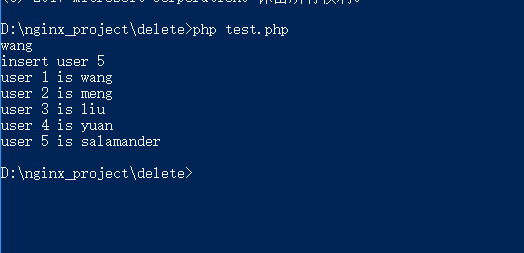小编给大家分享一下PHP使用PDO封装DB类的案例,相信大部分人都还不怎么了解,因此分享这篇文章给大家参考一下,希望大家阅读完这篇文章后大有收获,下面让我们一起去了解一下吧!
PHP如何利用PDO封装简单易用的DB类
使用
创建测试库和表
create database db_test;
CREATE TABLE `user` (
`id` int(10) unsigned NOT NULL AUTO_INCREMENT,
`name` char(11) NOT NULL,
`created_at` int(10) unsigned NOT NULL,
PRIMARY KEY (`uid`)
) ENGINE=InnoDB DEFAULT CHARSET=utf8;
INSERT INTO `user` VALUES ('1', 'wang', '1501109027');
INSERT INTO `user` VALUES ('2', 'meng', '1501109026');
INSERT INTO `user` VALUES ('3', 'liu', '1501009027');
INSERT INTO `user` VALUES ('4', 'yuan', '1500109027');代码测试
require __DIR__ . '/DB.php';
$db = new DB();
$db->__setup([
'dsn'=>'mysql:dbname=db_test;host=localhost',
'username'=>'root',
'password'=>'******',
'charset'=>'utf8'
]);
$user = $db->fetch('SELECT * FROM user where id = :id', ['id' => 1]);
echo $user['name'];
echo "\n";
$insertId = $db->insert('user', ['name' => 'salamander', 'created_at' => time()]);
echo "insert user {$insertId}\n";
$users = $db->fetchAll('SELECT * FROM user');
foreach ($users as $item) {
echo "user {$item['id']} is {$item['name']} \n";
}运行结果

DB工具类
<?php
/**
* User: Salamander
* Date: 2016/9/2
* Time: 9:16
*/
class DB
{
private $dsn;
private $sth;
private $dbh;
private $user;
private $charset;
private $password;
public $lastSQL = '';
public function __setup($config = array())
{
$this->dsn = $config['dsn'];
$this->user = $config['username'];
$this->password = $config['password'];
$this->charset = $config['charset'];
$this->connect();
}
private function connect()
{
if(!$this->dbh){
$options = array(
\PDO::MYSQL_ATTR_INIT_COMMAND => 'SET NAMES ' . $this->charset,
);
$this->dbh = new \PDO($this->dsn, $this->user,
$this->password, $options);
}
}
public function beginTransaction()
{
return $this->dbh->beginTransaction();
}
public function inTransaction()
{
return $this->dbh->inTransaction();
}
public function rollBack()
{
return $this->dbh->rollBack();
}
public function commit()
{
return $this->dbh->commit();
}
function watchException($execute_state)
{
if(!$execute_state){
throw new MySQLException("SQL: {$this->lastSQL}\n".$this->sth->errorInfo()[2], intval($this->sth->errorCode()));
}
}
public function fetchAll($sql, $parameters=[])
{
$result = [];
$this->lastSQL = $sql;
$this->sth = $this->dbh->prepare($sql);
$this->watchException($this->sth->execute($parameters));
while($result[] = $this->sth->fetch(\PDO::FETCH_ASSOC)){ }
array_pop($result);
return $result;
}
public function fetchColumnAll($sql, $parameters=[], $position=0)
{
$result = [];
$this->lastSQL = $sql;
$this->sth = $this->dbh->prepare($sql);
$this->watchException($this->sth->execute($parameters));
while($result[] = $this->sth->fetch(\PDO::FETCH_COLUMN, $position)){ }
array_pop($result);
return $result;
}
public function exists($sql, $parameters=[])
{
$this->lastSQL = $sql;
$data = $this->fetch($sql, $parameters);
return !empty($data);
}
public function query($sql, $parameters=[])
{
$this->lastSQL = $sql;
$this->sth = $this->dbh->prepare($sql);
$this->watchException($this->sth->execute($parameters));
return $this->sth->rowCount();
}
public function fetch($sql, $parameters=[], $type=\PDO::FETCH_ASSOC)
{
$this->lastSQL = $sql;
$this->sth = $this->dbh->prepare($sql);
$this->watchException($this->sth->execute($parameters));
return $this->sth->fetch($type);
}
public function fetchColumn($sql, $parameters=[], $position=0)
{
$this->lastSQL = $sql;
$this->sth = $this->dbh->prepare($sql);
$this->watchException($this->sth->execute($parameters));
return $this->sth->fetch(\PDO::FETCH_COLUMN, $position);
}
public function update($table, $parameters=[], $condition=[])
{
$table = $this->format_table_name($table);
$sql = "UPDATE $table SET ";
$fields = [];
$pdo_parameters = [];
foreach ( $parameters as $field=>$value){
$fields[] = '`'.$field.'`=:field_'.$field;
$pdo_parameters['field_'.$field] = $value;
}
$sql .= implode(',', $fields);
$fields = [];
$where = '';
if(is_string($condition)) {
$where = $condition;
} else if(is_array($condition)) {
foreach($condition as $field=>$value){
$parameters[$field] = $value;
$fields[] = '`'.$field.'`=:condition_'.$field;
$pdo_parameters['condition_'.$field] = $value;
}
$where = implode(' AND ', $fields);
}
if(!empty($where)) {
$sql .= ' WHERE '.$where;
}
return $this->query($sql, $pdo_parameters);
}
public function insert($table, $parameters=[])
{
$table = $this->format_table_name($table);
$sql = "INSERT INTO $table";
$fields = [];
$placeholder = [];
foreach ( $parameters as $field=>$value){
$placeholder[] = ':'.$field;
$fields[] = '`'.$field.'`';
}
$sql .= '('.implode(",", $fields).') VALUES ('.implode(",", $placeholder).')';
$this->lastSQL = $sql;
$this->sth = $this->dbh->prepare($sql);
$this->watchException($this->sth->execute($parameters));
$id = $this->dbh->lastInsertId();
if(empty($id)) {
return $this->sth->rowCount();
} else {
return $id;
}
}
public function errorInfo()
{
return $this->sth->errorInfo();
}
protected function format_table_name($table)
{
$parts = explode(".", $table, 2);
if(count($parts) > 1) {
$table = $parts[0].".`{$parts[1]}`";
} else {
$table = "`$table`";
}
return $table;
}
function errorCode()
{
return $this->sth->errorCode();
}
}
class MySQLException extends \Exception { }框架中使用建议
在框架中使用DB类,用单例模式或者用依赖容器来管理较好。
以上是“PHP使用PDO封装DB类的案例”这篇文章的所有内容,感谢各位的阅读!相信大家都有了一定的了解,希望分享的内容对大家有所帮助,如果还想学习更多知识,欢迎关注亿速云行业资讯频道!
亿速云「云服务器」,即开即用、新一代英特尔至强铂金CPU、三副本存储NVMe SSD云盘,价格低至29元/月。点击查看>>
免责声明:本站发布的内容(图片、视频和文字)以原创、转载和分享为主,文章观点不代表本网站立场,如果涉及侵权请联系站长邮箱:is@yisu.com进行举报,并提供相关证据,一经查实,将立刻删除涉嫌侵权内容。